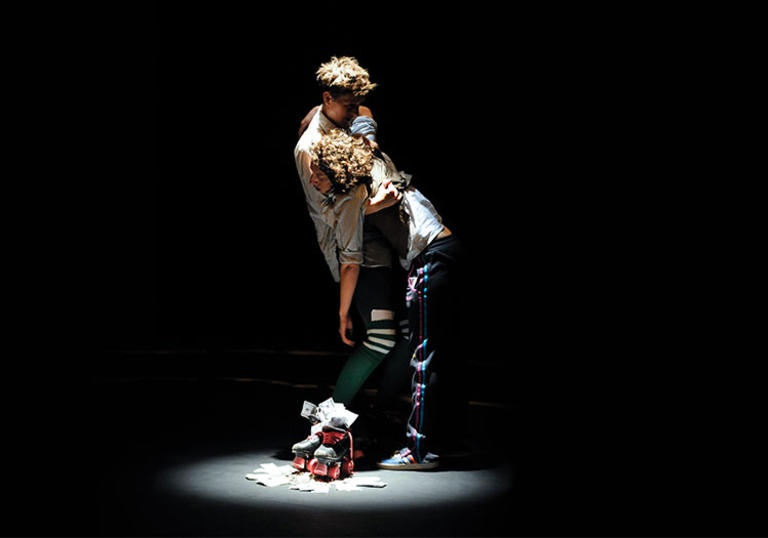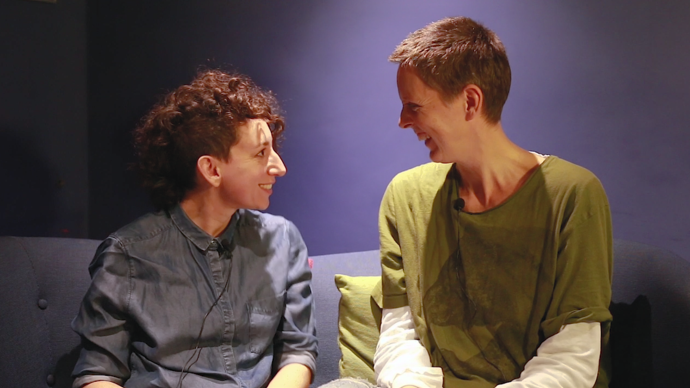Where do you find inspiration for your shows?
Rachel: The urgency to make a show comes when an internal offer suddenly chimes with something going on in the world. With ROLLER, we find ourselves thinking about our bodies, ageing and our space in the world, as issues of female visibility and power are in the ether in a critical way.
nat: and often these come from things that make us cross, injustices, voices that are not heard and experiences not traditionally in the spotlight. We know we’ve hit upon a good idea when it feels so impossible and so necessary that it makes us feel nauseous to even attempt it.
How much of your own personal experiences do you draw on?
R: A lot. That’s always the starting point. We think the personal is a great way in to think about the political.
n: and that personal is always densely interspersed with research from a broad range of sources and other peoples’ experiences, pop culture, found words … these all combine to create a whole.
What are some of the themes that keep popping up?
n: the workings of the body, gender trouble, female voices, female relationships, questioning voices of supposed authority, striving, queerness …
R: Tootsie.
n: always Tootsie.
R: I mean, that sounds flippant. But actually when we first met, we found we both had this deep love of that film from when we were children. And it absolutely addresses gender trouble, striving and the female body.
Can you give us one example of how you researched ROLLER?
n: we loved our time with the Brighton Rockers roller derby team, hanging out in a sports hall surrounded by ferociously fit and passionate women learning strategic ways to slam their bodies together.
R: We spent one evening strapped into every type of padding you can imagine being taught that the way you stop yourself rolling forward when on roller skates is to send weight down into the ground through your vagina.
n: that was never in my physics lessons.
We’re both really interested in risk-taking in theatre but we come at it differently
Do you ever argue vociferously in the middle of the creative process?
R: I’d like to say ‘yes’, that we’re always fighting and throwing humous at each other. But generally no. It’s a process absolutely powered by debate and conversation but it has never tipped into arguing.
n: sometimes in the heightened atmosphere in the few days before opening a show, our differences can lead to tensions that sometimes leak out. We call it ‘paper cutting each other’ and we have become quite adept at noticing, naming and stopping it.
You’re a theatrical double act – tell us about your individual approaches to performance and how they come together in Mars.tarrab?
R: We first came together because we were both working on our first solo shows and were nervous about presenting them. Instead we created a mash-up show. And we liked it.
n: you also work as a solo performance artist whereas the solo work that I do is visual art. So when something in the world shouts to both of us for attention, we come together to make work. One example of where we differ is the way we employ risk. We’re both really interested in risk-taking in theatre but we come at it differently. I’ll always want to bounce really high, skate really fast, balance really precariously … I find physical risk thrilling and key to theatre being absorbing for an audience.
R: Whereas at the moment I’m interested in taking risks with theatrical form. Which is infinitely less terrifying for my body. And my mother.
n: As we head into this show exploring roller derby, those differences will most probably get some air time.
What double acts have inspired you?
R&n: The Two Ronnies, Morecambe & Wise, French and Saunders, Maya Rudolph and Kristen Wiig, Ade Edmondson and Rik Mayall.
n: and Cagney & Lacey.
R: … for you.
Wherever we work, whether at the Barbican or in a bathtub in Islington, we’ve always got that starting point
How important are strong visual elements to your shows?
n: historically we have always made images from our bodies – one short, one tall – and exploited these similarities and differences. Wherever we work, whether at the Barbican or in a bathtub in Islington, we’ve always got that starting point.
R: The visual element is the guts of our work. You being a visual artist and theatre designer as well as a performer makes the visual aspect of the work integral to the making. Left on my own, it might all be words, and I think people tend to remember images more than words so we are rigorous when constructing them.
n: we take complex cerebral concepts and figure out ways to transform them into arresting stage pictures. We seek to represent something but also critique it from within the image.
R: For example, in our last show about the 1980s (The Lady’s Not For Walking Like An Egyptian), we were wrangling for days with the free market economy. We finally translated it into an image involving the two of us, a huge unstable ladder, a handbag full of edible money, a Margaret Thatcher wig and lots of Lycra.
n: that’s an image that audiences say they remember.
What does it feel to be putting on a show at the Barbican?
n: it feels like a great invitation to innovate and extend what we do and how we do it.
R: An honour, knowing all the influential artists that have performed on those stages before us.
n: we’ve not worked with such a large organisation before. There’s a certain pressure in that and we are excited about what might arise – it may release us into a new kind of creativity.
R: What happens when you bring a hitherto DIY queer aesthetic into a bigger more mainstream establishment?
n: we’ll tell you in November.


